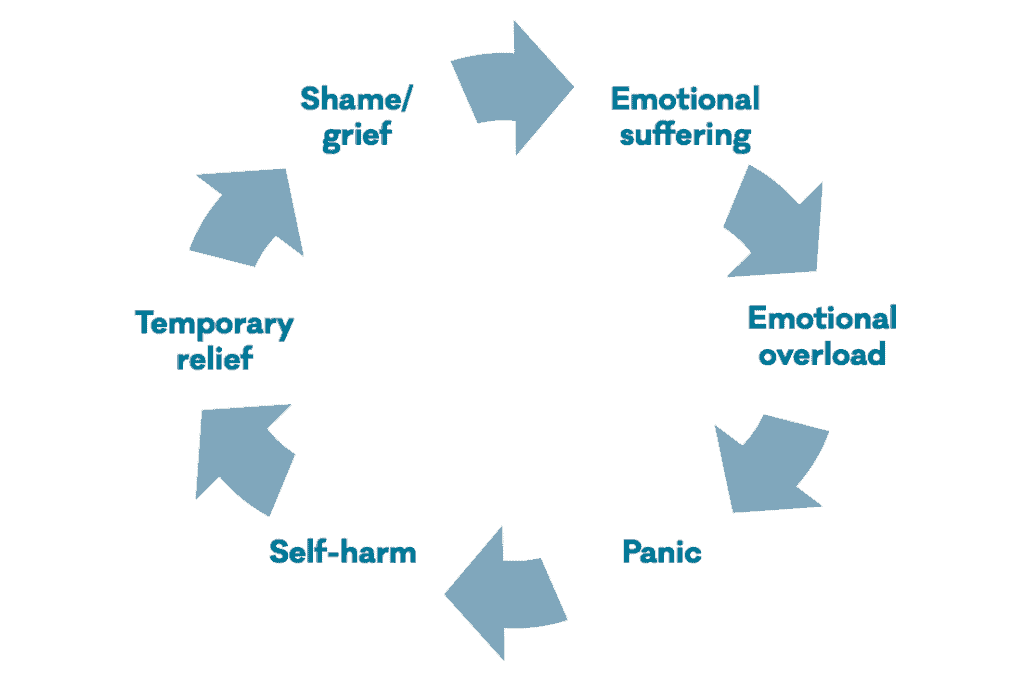“I started self-harming when I was 15 or 16. I can’t remember why I decided to start, but that’s what I did.”
~ Mind, 2016
We are delving into the topic of self-harm/injury this month. We know this is an extremely sensitive and emotional topic, and that reading about it can be a trigger to some people. So, in this article we have tried to be as respectful and considerate as we can. If at all anything that we have said comes across as insensitive or inconsiderate during this month, then we sincerely apologise as that is not our intention at all.
This week let’s look at what drives people to self-harm. The first, and most important, thing when answering this question is to realise that self-harm has no fixed rules or straightforward reasons. Just like every human is unique, so are their experiences, struggles, and life journeys. Thus, there are multiple reasons that can trigger someone to start self-harming:
- Traumatic experiences, like sexual abuse or physical violence, death and bereavement, or having an accident or miscarriage
- Emotional abuse and being in toxic or difficult relationships at home, school or work
- Bullying, peer-pressure, or coping with cultural and familial expectations (for example marriage)
- Suffering a mental health disorder, such as depression, eating disorders, or personality disorders
- Eating disorders, like anorexia and bulimia
- Smoking, and drug and alcohol abuse
- Health and financial insecurity
- Feeling ignored, lonely, out of control and powerless to change anything
“I don’t self-harm for other people. It is a coping mechanism, and, yes, I know it is not a very good one.”
~ Time to Change, 2017
People usually begin self-harming to alleviate their strong emotions and unbearable feelings, resulting from any of their triggering experiences. It can help individuals feel like they are in control and reduce feelings of tensions and distress. Alternatively, it can alleviate feelings of guilt and shift one’s focus from emotional/mental pain to bodily pain. Once they start, that’s when it becomes dangerous. This is because immediately after self-harming, they feel unburdened and relieved. However, the relief is only temporary and soon after gives way to grief and shame, because the underlying reasons remain unsolved. This can lead to more emotional suffering and continue the cycle of self-harm. Pretty soon, this can become a normalised habit to cope with emotional overloads and burdening distress.
Thereafter, self-harming becomes a friend – filling the gap in our life, an unbreakable cage, locking us in with no idea how to get out.
 Source: Mental Health Foundation, 2018
Source: Mental Health Foundation, 2018
“When I get overwhelmed it helps – it lets a bit of it out and makes it easier to keep going. It can stop my flashbacks, it can help me sleep when I’m afraid.”
~ Say Women, 2017
The prognosis of self-harm is very bleak and worsens the situation that one is trying to avoid or cope with. It also negatively impacts mental health in the long run as it is directly linked to low self-esteem, clinical depression, increased feelings of anger and hopelessness, social anxiety and anti-social behaviour (NHS Choices, 2015). Additionally, the physical scars left are as debilitating as the mental ones, and could become a constant reminder of a time that, in the future, we may wish to forget.
“I’ve learnt that, as my emotional needs were not being met, I used self-harm because I didn’t know how to express myself or say what I needed or wanted. A part was also for attention, I was desperate for someone to notice me and help me.”
~ Mind, 2016
References:
Healthy Place. (2016, August 26). I’ll Tell You Why People Cut Themselves – Self Injury – Abuse. Retrieved from https://www.healthyplace.com/abuse/self-injury/ill-tell-you-why-people-cut-themselves/
Mental Health Foundation. (2018, February 06). The truth about self-harm. Retrieved from https://www.mentalhealth.org.uk/publications/truth-about-self-harm
Mind (2016). Understanding: self-harm. Retrieved from https://www.mind.org.uk/media/5133002/mind_und_self-harm_singles_4-web.pdf
NHS Choices. (2015, June 04). Self-harm. Retrieved March 09, 2018, from https://www.nhs.uk/conditions/self-harm/
Say Women. (2017, December 6). Self-harm and survivors. Retrieved from https://www.say-women.co.uk/single-post/2017/12/06/Self-Harm-and-Survivors
Time to Change. (2017, October 27). Self-harm. Retrieved March from https://www.time-to-change.org.uk/about-mental-health/types-problems/self-harm




